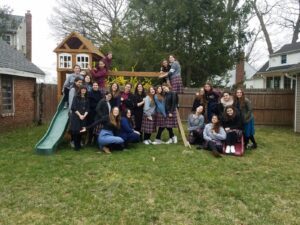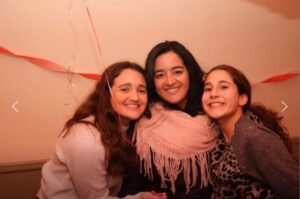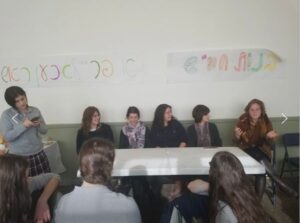 Meet the Chinuch Shluchim: Ms. Chaya Toby Lieblich began as a preschool teacher and left Chinuch for other career options. She eventually returned to teach teenagers and explains why she’s happy she did.
Meet the Chinuch Shluchim: Ms. Chaya Toby Lieblich began as a preschool teacher and left Chinuch for other career options. She eventually returned to teach teenagers and explains why she’s happy she did.
This Week: Ms. Chaya Toby Lieblich teaches Jewish history, global history, and English at Bnos Chomesh Academy in Crown Heights, New York. She started her career as a preschool teacher but after a few emotionally draining years, walked away from Chinuch to explore other jobs. Eventually, Chaya returned to Chinuch finding her ultimate calling as a teacher of what some consider the most challenging age: high school teens.
How did you begin your teaching career?
I never set out to be a teacher. After seminary, I needed to find a job. As I was going through the classifieds, I realized what I didn’t want to do – working in an office or in a store. Then, I saw an ad for an assistant in a preschool classroom and no experience needed. I thought I could try that.
I started out as an assistant preschool teacher in a Yeshiva in Southern Brooklyn. Unfortunately, the school could have been better run, and the lead classroom teacher would often leave my co-assistant teacher and me alone to manage a classroom of 20-25 little kids. I quickly learned how to manage a full classroom. My sister-in-law was in education, so I reached out to her and she started giving me tips and advice. It was trial through fire, but I found that my classroom ran really well and I was really proud of it. I decided that I wanted to pursue Chinuch more formally.
So if you started in preschool, how did you end up teaching high school?
After that first job, I moved to a Chabad preschool where I taught for three years. It was an intense time when I was both teaching and completing my degree. The third year was an incredibly emotionally draining year for a variety of reasons, and at the end of the year I was completely burnt out.
I knew I couldn’t bring myself to go back to the classroom and decided to leave the field of teaching altogether. Soon after, I started working in a store and then an office – all the places I didn’t want to work when I was first looking for a job at eighteen years old. During that time, I went to culinary school thinking I should become a pastry chef. I tried everything I could to occupy myself and maybe try to find fulfillment somewhere else.
The next year, I was working in a bakery and was absolutely miserable. My mother gently told me that maybe I should consider teaching again because that was the place where I seemed the most fulfilled and the happiest. I agreed but did not want to go back to preschool.
After considering a lot of different teaching positions, I thought that maybe high school would be the most interesting and challenging. I was intimidated by the big schools and wanted to try a smaller school, so I got a job at Bnos Chomesh Academy. I have been there ever since. (Nine years now).
After nine years of teaching high school, what is your perspective on the importance of this position today?
I feel that teaching high school is different and at the same time, in a way, more important than teaching any other grade. We hear a lot about how the next generation will go out and change the world. The experience a student has in high school will most closely and directly affect how they then go into the world. It’s up to us to give our students the most positive experience, the most centered and grounded knowledge, so that they can then take it with them into the next stage of their life.
How do you build that relationship with students?
Relationships are at the heart of what BCA does. It is in the way we interact and speak to students. We stop to talk to students in the hallway. If there is something a student is interested in, we bring it up to draw their interest. To affect a student positively, you need a positive relationship to begin with. The beginning of the year is about setting the ground rules and getting to know the girls. Then 2-3 months in you can start to channel it a little deeper. That’s where you can start taking it deeper and try to build something. But you first need that strong positive framework on which to build.
What is your teaching methodology?
Over the years, I have learned to now incorporate more student-led work. Instead of me telling everything, I encourage them to learn the information for themselves and see what they can discover. It gives them greater ownership over their learning experience.
How have you avoided burnout in your second round of becoming a teacher?
I made a conscious decision that I would only do this if I am giving the best to my girls and the best to myself. One of the things I started doing as soon as I started teaching again was that every Friday night when I light candles one of the things I ask Hashem is that I have a positive impact on my students and that they have a positive impact on me. I ask Hashem to give me the right words to say to them at the right moment.
As a teacher, I’m not there for me, I’m there for them. But I have to be there for me too in order to make sure that I’m the right keili. I can’t extend myself so far that I get drained. I have to be mindful so that I can be Hashem’s best Shliach in what I’m supposed to be doing. I really feel that this is my shlichus. I need to perform that in the best way possible.
How do you view your role in the classroom?
I once heard on a Chassidus podcast someone share that she goes running, but she doesn’t call herself a runner. If she calls herself a runner and then one day has a bad run, she feels defeated and depressed, because “I’m a runner, why did I have a bad run? I should be perfect at this!” It was a metaphor for how we are supposed to always strive to be a Beinoni – always strive to be better. So don’t ever define yourself as “I am this,” because you’re always in the process of getting there. People ask me what I do in BCA and I say “I try to teach.” I don’t say I’m a teacher. I try to teach and every year try to teach better than I did the year before.
 I take what I did the year before, think about what worked and what didn’t and make it better for the next year. It’s always a process of growth.
I take what I did the year before, think about what worked and what didn’t and make it better for the next year. It’s always a process of growth.
How do you approach students who may display challenging behaviors?
I learn so much from my coworkers and from Mrs. Dena Gorkin. I remember we once had a student many teachers struggled with in the classroom. Mrs. Gorkin sent out an email to the staff about the situation and she wrote “‘Rabbi Chanina said, I have learned much from my teachers, and even more from my friends, but from my students I have learned more than from all of them.’ This is ______, and we are all going to learn so much from her.” Then she went on to detail a behavior plan. It reframed the approach that we are here for this girl and we are all going to grow and learn from this experience.
What do today’s high school girls need?
I wish my students would know how valuable they are to Hashem and that they, as an individual person, are chosen and special. If they each had that sense of pride in themselves and their identity, knowing their purpose on earth and in this world, so many of their struggles would disappear. They wouldn’t need to look elsewhere for love and validation. Our goal at school is to give them that feeling of purpose and self-fulfillment.
What would be your advice to fellow teachers?
We always have workshops where we talk about the students and acknowledge that the student might be having a bad day. When your student is having a bad day, you need to be kind and gentle. But as teachers, we also need to be doing this to ourselves. We are human and always doing our best. We are always working and trying to be better. Today’s lesson didn’t work really well? Give yourself some kindness and try again tomorrow. If that’s the philosophy we have regarding our girls, then that’s the philosophy we should have regarding ourselves.
What are some of your interests outside of teaching that keeps you grounded?
I love baking and painting. I find baking sourdough really fun. I spend time with my nieces and nephews and read books. Outside of school, I do spend time grounding myself so that the next day I can return refreshed and resilient. Before I go to sleep, I do deep breathing to calm myself down because if I am centered, I am able to go back to school the next day.
In the summer, I take time to travel and recharge. I need to be mindful that when I am teaching, I am present and aware, but it doesn’t take over my life. If I want to give my girls my best and give myself my best, I need that space to just breathe.
 What is your message to people considering going into Chinuch?
What is your message to people considering going into Chinuch?
Teaching is not only for you but for the next generation. You are part of creating the next generation. In order to do that, you need to have them and yourself in mind so that you can give them the best of you. It is a balancing act. We know from Torah, the Rebbeim and Chassidus that if you go into it with the right mindset, outlook and perspective, then Hashem rewards you and you will see the benefits.




